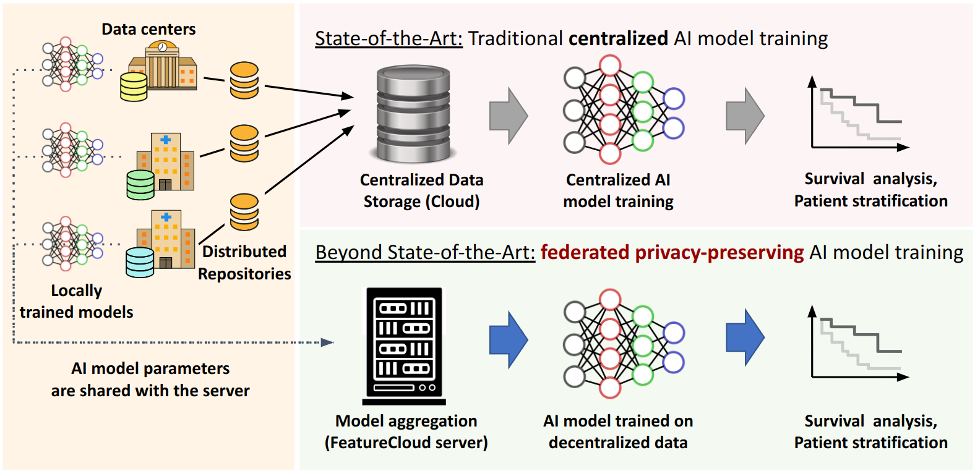FLIGHT
FLIGHT - Federated Learning-Guided digital Health

Prostate cancer is the second-most frequent cancer in Germany and the third most frequent in men worldwide. To classify tumor severity and identify optimal treatment options, tissue microarrays (TMAs) are acquired from the patient's prostate and stained with hematoxylin and eosin (H&E). The pathologist then grades the appearance of the cancer according to the Gleason grading system. However, since the system is subjective, grading can vary considerably among pathologists. A computer-aided decision support system detached from identifying Gleason patterns is therefore desirable.
For AI-mediated survival or time-to-event prediction of prostate cancer patients, the Institute of Medical Systems Biology (PI Bonn) previously developed the de facto state-of-the-art analysis, eCaReNet (explainable Cancer Relapse prediction Network). It is an end-to-end trained neural network that takes TMA spots as input and outputs the probability of relapse-free survival over time.
Since high biological and technical variation is intrinsic to biomedical data, large sample sizes are needed to train accurate AI models, but limited patient availability per institution and data protection regulations make it difficult to obtain such data.
To improve the accessibility of biomedical data without violation of personal data regulations, we suggest training AI models on distributed datasets with the use of privacy-enhancing techniques such as Federated Learning (FL) and Secure Multi-Party Computation (SMPC). FL implies collaborative model training on decentralized data owned by multiple participants, by the exchange of model parameters computed from their local data. In SMPC, all computations are performed on the secret shares of the data distributed across computing parties, such that no party can recover private data belonging to any other party.
This novel tool will become publicly available via FeatureCloud platform developed by PI Baumbach. The performance of federated AI models will be evaluated using a dataset provided by the department of Pathology (PI Sauter) of the UKE consisting of images obtained from more than 17,000 patients. The dataset includes several sub-datasets to further evaluate generalizability to an unseen dataset bias, which makes it ideal for a realistic simulation of a multi-center study.
With the development of joint federated AI approaches we envision that FLIGHT can lay the blueprint for collaborative learning on sensitive or simply excessively large data across many institutions and centers in Hamburg.
Principal Investigators:
Stefan Bonn, Zentrum für Molekulare Neurobiologie (ZMNH), Institut für Medizinische Systembiologie
Jan Baumbach, Zentrum für Bioinformatik, Computational Systems Biology
Guido Sauter, Institut für Pathologie mit den Sektionen Molekularpathologie und Zytopathologie
